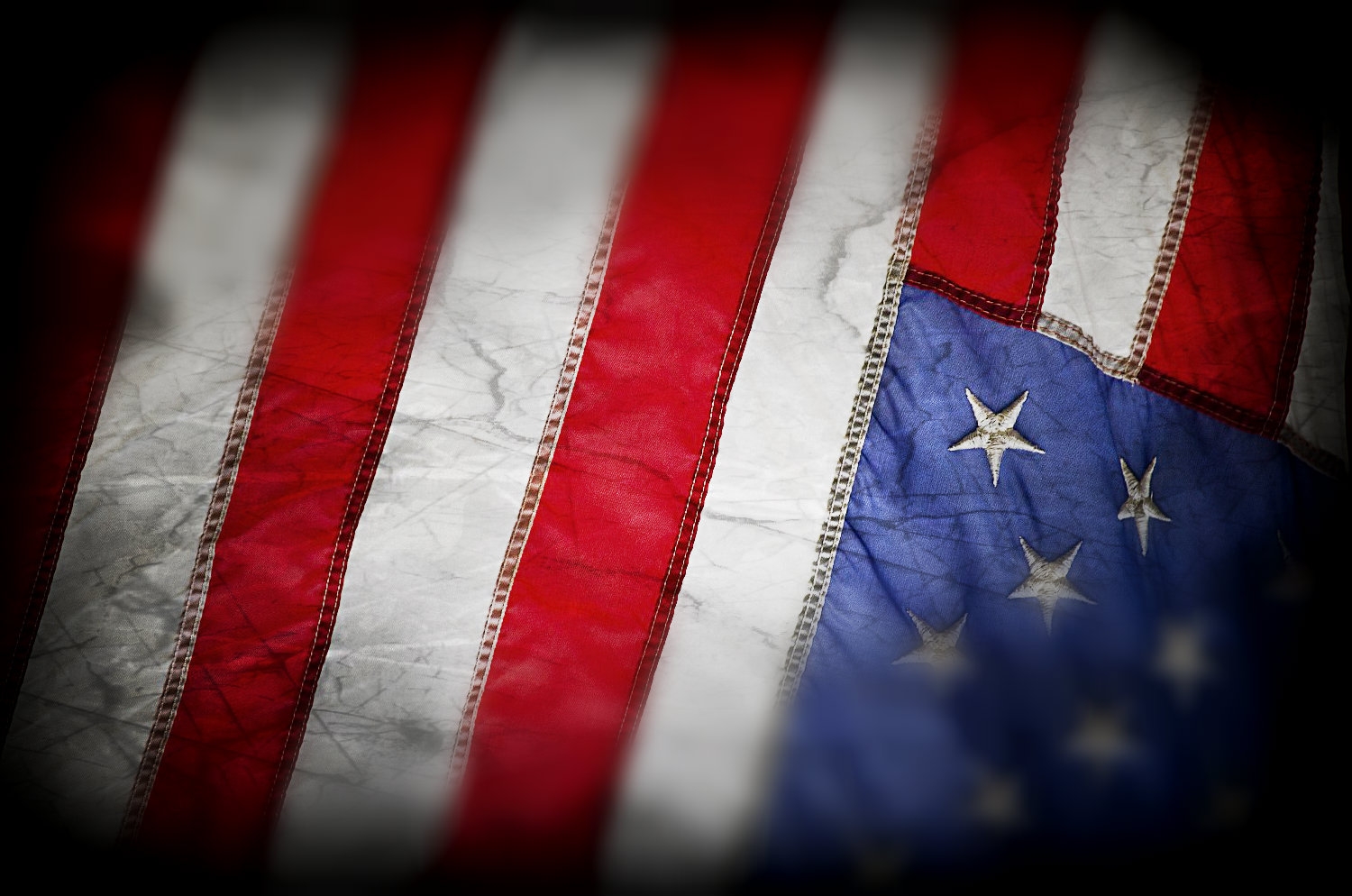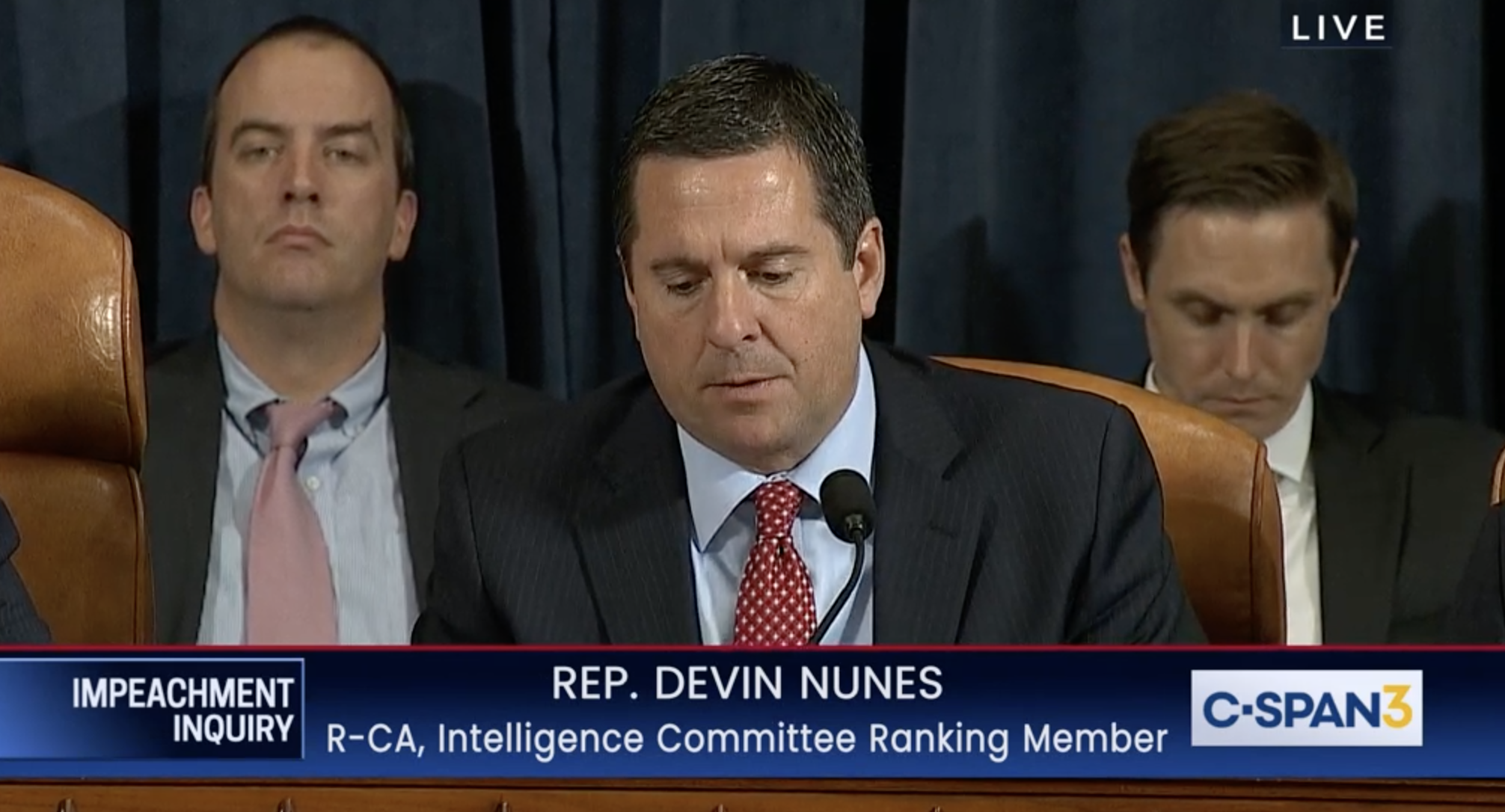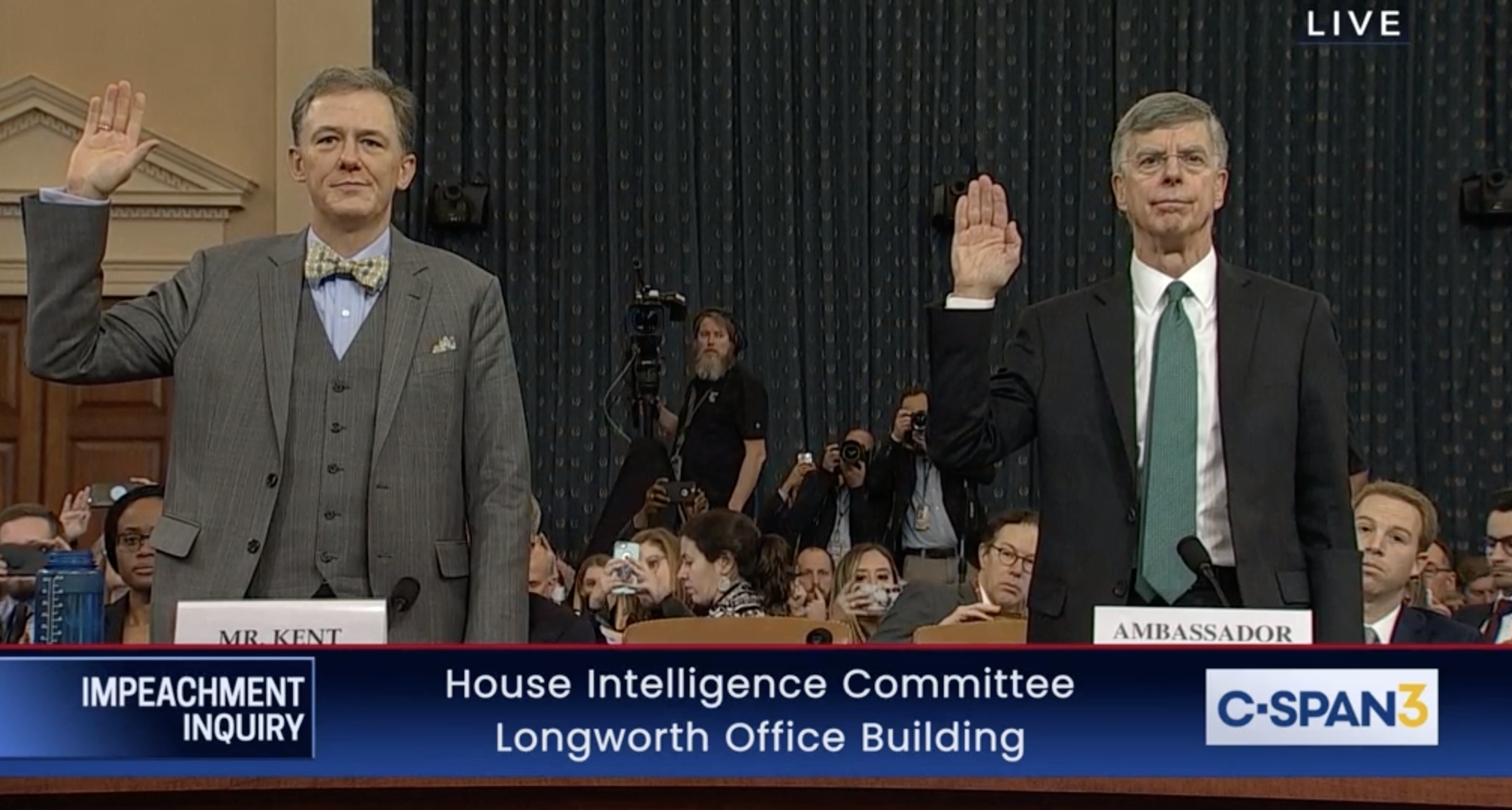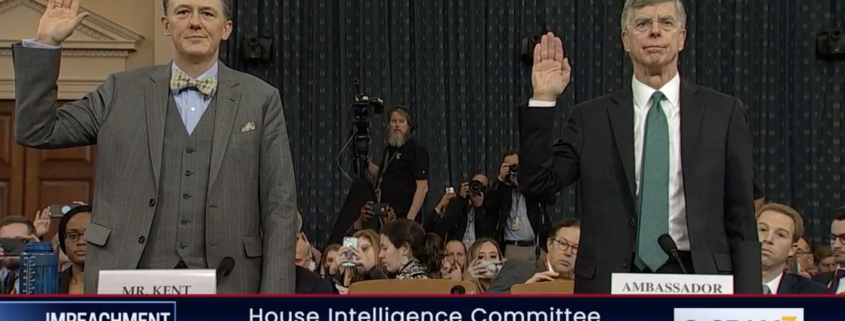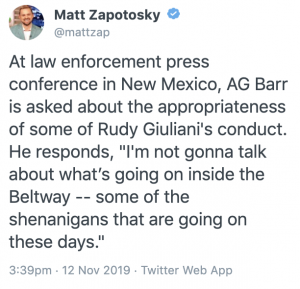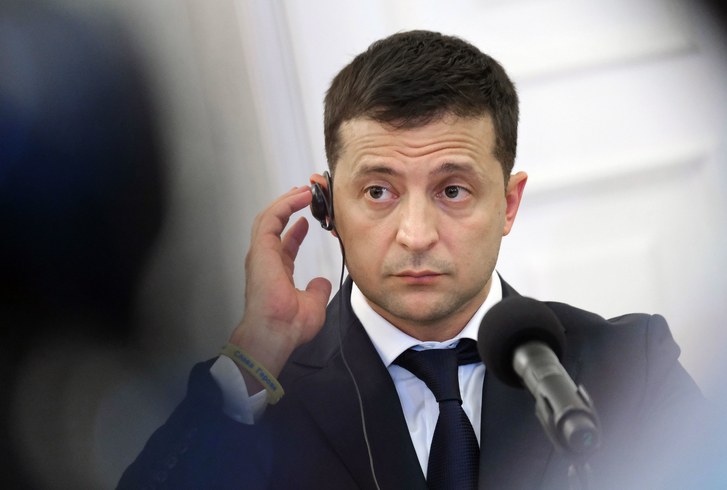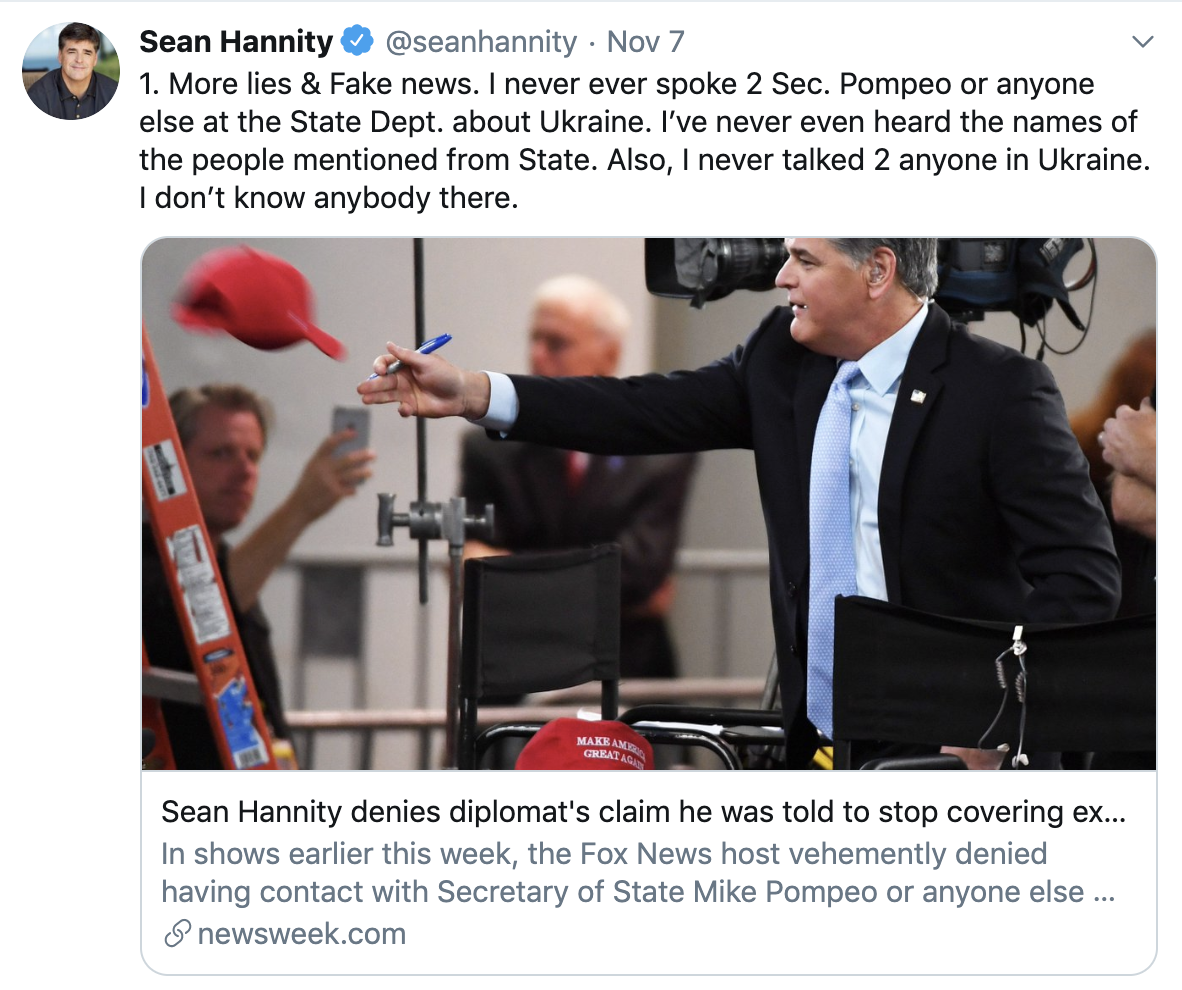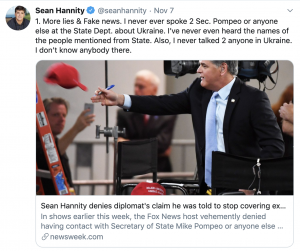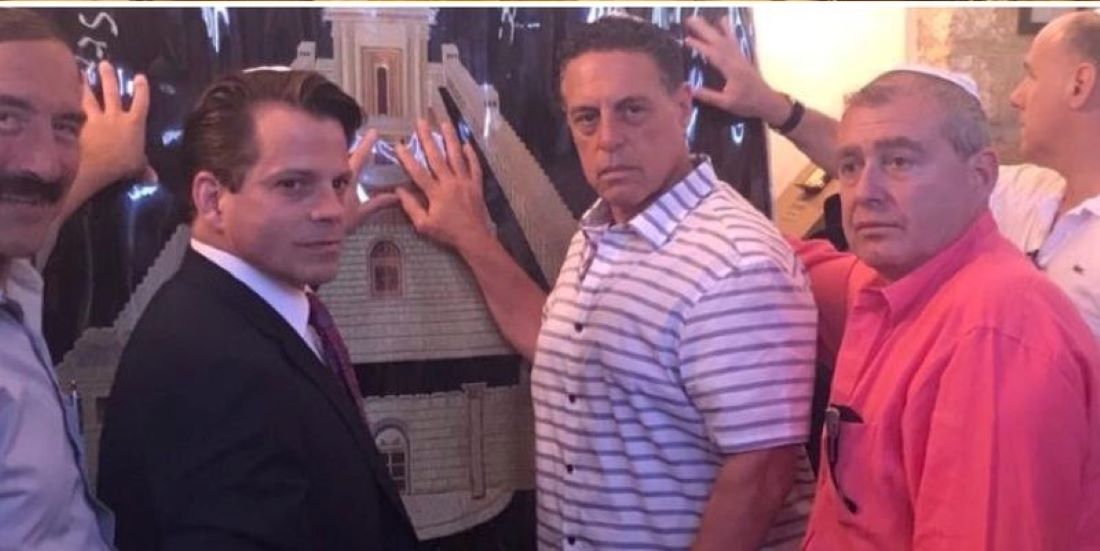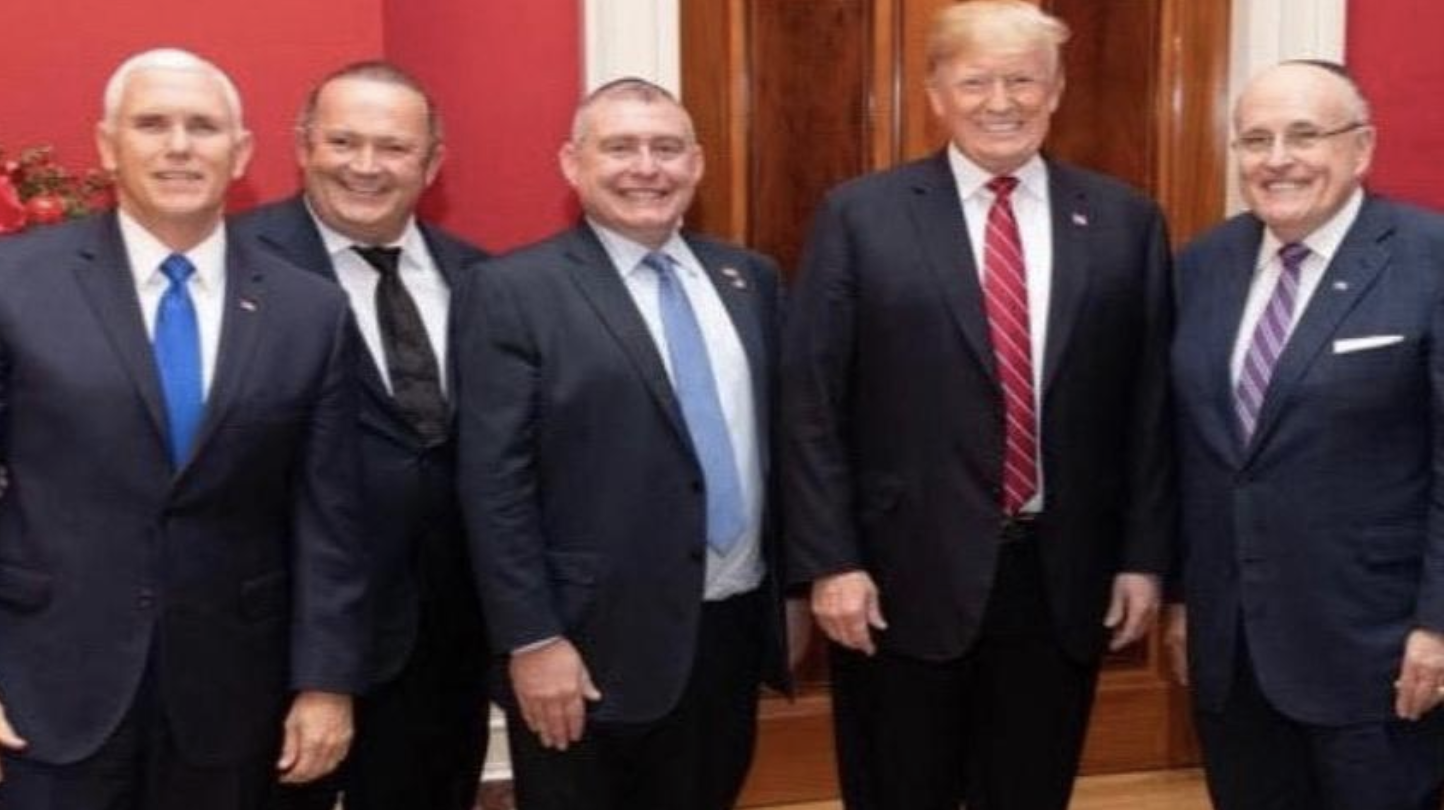Before I get into how gullible DOJ reporters continue to be in this WaPo story relaying how Bill Barr refused to publicly announce that the President broke no law in his July 25 phone call with Volodymyr Zelensky, let me review a series of overt acts that might fairly be deemed part of what DOJ has already charged as a conspiracy.
DOJ fails to do the most basic “connect-the-dots” assessment implemented after 9/11
First, after John Demers went to the White House and discovered that his boss was implicated in a phone call that a whistleblower had complained about, when the Intelligence Community Inspector General sent a more formalized complaint to DOJ, DOJ limited the scope of their review of the complaint to one small part of it, just the TELCON, not the full complaint. This had the effect of preventing anyone from doing what the entire surveillance apparatus of FBI has been designed to do since 9/11, which is to search in their databases for all the people mentioned in a lead to find out if that lead connects to other known criminals. Here’s some of what DOJ knew when on the Ukraine investigation.
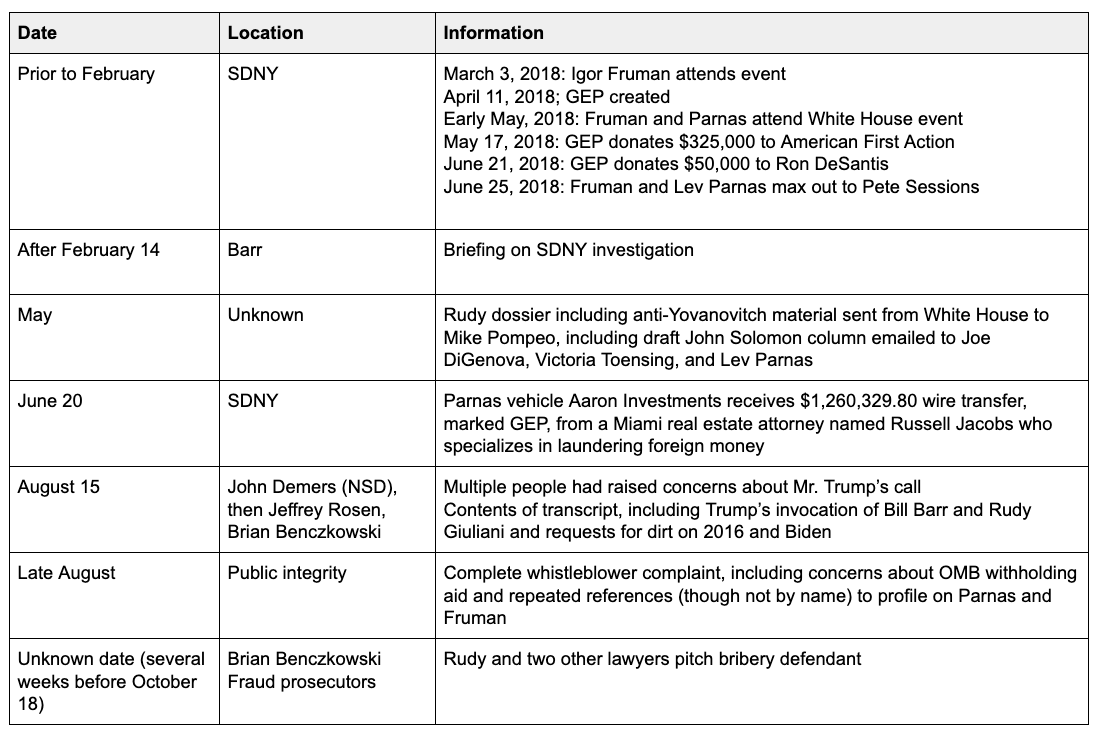
Had anyone followed the standard connect-the-dot rules in reviewing the whistleblower complaint, they would have searched on all the names in the references in the complaint, including those in this OCCRP piece, which was mentioned multiple times in the complaint.
That piece is a profile of Igor Fruman and Lev Parnas.
So if any person reviewing the whistleblower complaint had followed the approach put into place to protect the nation after 9/11, that person would have discovered:
- Fruman and Parnas were making big donations to Republicans tied to certain policy outcomes and paying for those donations through a shell company
- Parnas was also involved in propaganda sent, on White House stationery, to State in support of the same policy outcomes
- The money for the shell company came from a lawyer who specializes in laundering money through real estate for foreigners
- One policy issue Fruman and Parnas were pushing with their donations was one of the policy outcomes described in the Trump-Zelensky call, the withdrawal of Marie Yovanovitch
In short, there is no way a competent investigator would have done a connect-the-dots assessment on the whistleblower complaint and not realized it was closely related to a Full Investigation bearing down on an indictment in SDNY.
Instead of doing that marginally competent assessment, DOJ instead gave the whistleblower complaint the all-clear, in part by severing the transcript (which was damning enough) from the backup (which described OMB withholding funds, which is a separate crime, but also included the reference to the profile on suspects against whom SDNY had a fully predicated investigation into related actions). The decision to consider only the transcript affirmatively prevented DOJ from doing the kind of dot-connecting everything since 9/11 has claimed to support.
Whoever made that decision — whether willfully or unknowingly — prevented DOJ from formally realizing that the President’s call was closely tied to behavior that DOJ would indict less than two months later.
DOJ fails to share the whistleblower complaint with the FEC
At that point in late August, having decided that no crimes were committed, DOJ should have shared the whistleblower complaint — which even DOJ acknowledged raised possible election related crimes — with the Federal Election Commission under the terms of a Memorandum of Understanding they have. As of October 18, according to a letter from Ellen Weintraub responding to questions from Amy Klobuchar, DOJ had not done so.
This is the second time that you, as Ranking Member of the Senate Rules Committee with jurisdiction over federal elections, have written to commissioners of the Federal Election Commission to get a simple Yes or No answer to the question: Did the Department of Justice (DOJ) notify the FEC about or refer to the FEC a campaign finance complaint regarding potential violations of the foreign national political-spending ban by the President? Your October 2 letter specifically referenced a New York Times op-ed referring to a complaint reportedly originating with the Office of the Inspector General of the Intelligence Community.1 As noted in the Commission’s October 8 response, the FEC does not generally confirm or deny the agency’s receipt of notice or a referral from DOJ.2 However, you have asked me an important question in the exercise of your oversight authority, and commissioners should be responsive if it is legal for us to do so. It is.
For these reasons, I am answering your question: No. The FEC has not received a notification or referral from DOJ regarding the complaint you reference.
While DOJ is empowered to make any decisions about whether the call involved a crime, FEC is empowered to make decisions about whether it merits a civil penalty. And FEC might have connected the dots DOJ failed to. They would have seen that the phone call related to a campaign finance complaint plus follow-up it had already received on Parnas and Fruman, so it would have known almost as much as DOJ, had DOJ tried to connect the dots.
It turns out, it is a crime to prevent the FEC from learning information it needs to do its job. It’s not only the crime DOJ is about to charge the Russian Internet Research Agency trolls with a superseding indictment for, but it’s the crime that SDNY charged Parnas and Fruman with even before Weintraub sent her letter.
DOJ might have decided that they didn’t need to forward the complaint because Republican Matthew Petersen resigned from the FEC on the suspiciously timed August 26 and so ensured FEC couldn’t conduct any official business. But as the timing of the Parnas and Fruman indictment — which Bill Barr knew about — makes clear, DOJ still believes it can charge people for withholding information from FEC.
DOJ delays notifying Congress and hides Bill Barr’s involvement by overclassifying their OLC memo
Then, having prevented FEC from receiving information that would alert them that the President had a dodgy call that related to an existing campaign finance complaint, OLC tried to prevent Congress from learning of this — as required by whistleblower laws — by writing an OLC memo saying that this complaint did not amount to an official action.
OLC head Steve Engel wrote that memo on September 3, by which day DOJ should have alerted the Intelligence Committees of the complaint. That memo was used as an excuse to delay informing Congress. That delay included over a week during which the Administration continued to illegally withhold duly authorized security funding from Ukraine without explaining to Congress why it was doing so, a delay that Bill Taylor said (in his testimony to Congress) did real harm to Ukraine. All told, the OLC memo succeeded in delaying sharing the complaint with Congress for 23 days, something that DOJ’s own Inspector General noted (in a letter written on behalf of 70 Inspectors General) was a clear violation of the Intelligence Community Whistleblower Protection Act.
As Congress has done in every other whistleblower law passed since 1978, it entrusted IGs to play a central role in the evaluation of the information provided. Specifically, the ICWPA requires an IG to make within 14 days a factual determination as to whether an alleged urgent concern provided to the IG “appears credible.” If the IG determines that the allegation appears credible, which necessarily includes a determination by the IG that it involves an “urgent concern,” the IG is required to forward the allegation to the head of the agency and the agency head “shall” forward it to Congress within 7 days “with any comments.” The ICWPA’s use of the word “shall” makes it clear that the statute does not authorize the agency head, or any other party for that matter, to review or second-guess an IG’s good faith determination that a complaint meets the ICWPA’s statutory language.
Worse still, DOJ tried to delay informing Congress that Bill Barr was personally implicated by this call by overclassifying the OLC memo — in part by treating Barr’s implication in it, which the White House had deemed Secret, as Top Secret — and having done so, sharing a water-downed version of its own OLC memo with Congress on September 24 that hid Barr’s role and other key details.
Bill Barr continues to engage in overt acts in a conspiracy to provide John Durham propaganda to support an investigation into those who investigated Trump
And all this while — in the period while DOJ was scoping its own investigation to avoid connecting the dots and while DOJ was preventing FEC from learning of the whistleblower complaint and while DOJ was preventing Congress from receiving the complaint (the latter two acts in contravention of the law) — Bill Barr continued to engage in overt acts in the broader conspiracy to collect and provide to John Durham corroboration (no matter how sketchy or obviously coerced) that the investigation into Trump’s ties to Russia was ginned up by the Deep State.
Mind you, Barr may have already committed an overt act in the Ukrainian side of this conspiracy. By September 25, according to a DOJ statement, individual Ukrainians had already “volunteered” information to Durham.
A Department of Justice team led by U.S. Attorney John Durham is separately exploring the extent to which a number of countries, including Ukraine, played a role in the counterintelligence investigation directed at the Trump campaign during the 2016 election,” DOJ spokeswoman Kerri Kupec said Wednesday. “While the Attorney General has yet to contact Ukraine in connection with this investigation, certain Ukrainians who are not members of the government have volunteered information to Mr. Durham, which he is evaluating.”
Barr is micromanaging Durham’s investigation, so there’s little chance that these “volunteers” got from Rudy Giuliani to Durham without Barr’s own involvement.
In addition, Barr took a meeting with Victoria Toensing and Joe DiGenova to talk about their client, the mobbed up Dmitry Firtash, which was something valuable the lawyers could offer to the Firtash in exchange for him funding the Parnas and Fruman influence operation. To be sure, the Supreme Court has determined that taking a meeting does not amount to a thing of value amounting to bribery. But their ability to get such a meeting was nevertheless one of the reasons Firtash replaced Lanny Davis with Toensing and DiGenova and, in exchange, helped them feed propaganda to the Durham investigation.
The head of the Criminal Division, Brian Benczkowski, also took a meeting with Rudy in this time period (it’s unclear which client Rudy was pitching), but he claims to be unaware of the investigation into Rudy that was ongoing at SDNY, which may well be true but if so is tantamount to a confession that Benczkowski did not attempt to connect any dots on the whistleblower complaint.
But as to Barr, even as this story was breaking, Barr was in Italy pretending to be a Line FBI Agent, watching movies created by the Russian linked lawyer for Joseph Mifsud, in hopes of getting Italy to tell him and Durham that Mifsud was actually a Western intelligence asset and not the Russian one that Mueller (and abundant public evidence) suggested him to be.
In other words, by September 25, someone had already shared “evidence” with the Barr-micromanaged Durham investigation from the Ukrainian side of this information operation, and Barr was in Italy looking for more propaganda, to say nothing of how his meeting with Dmitry Firtash’s lawyers helped fund the information operation.
Barr did not publicly exonerate Trump personally — he had Kerri Kupec do it for him
I apologize for being long-winded. But all that is the necessary context that DOJ beat reporters should bring to a story on what Barr did in response to a request from Trump to make a public statement exonerating the President. Here’s the news in the WaPo piece, amid a bunch of Barr’s past PR and absent most of the details I’ve laid out above.
President Trump wanted Attorney General William P. Barr to hold a news conference declaring that the commander in chief had broken no laws during a phone call in which he pressed his Ukrainian counterpart to investigate a political rival, though Barr ultimately declined to do so, people familiar with the matter said.
The request from Trump traveled from the president to other White House officials and eventually to the Justice Department. The president has mentioned Barr’s declination to associates in recent weeks, saying he wished Barr would have held the news conference, Trump advisers say.
[snip]
The request for the news conference came sometime around Sept. 25, when the administration released a rough transcript of the president’s July phone call with Ukrainian President Volodymyr Zelensky.
[snip]
As the rough transcript was released, a Justice Department spokeswoman said officials had evaluated it and the whistleblower complaint to see whether campaign finance laws had been broken, determined that none had been and decided “no further action was warranted.”
It was not immediately clear why Barr would not go beyond that statement with a televised assertion that the president broke no laws, nor was it clear how forcefully the president’s desire was communicated. A Justice Department spokeswoman declined to comment. A senior administration official said, “The DOJ did in fact release a statement about the call, and the claim that it resulted in tension because it wasn’t a news conference is completely false.”
So, at a time after someone had already shared Ukrainian information with the Barr-micromanaged Durham investigation, after Barr had met with lawyers who were trading that access for propaganda to feed Durham, after Barr’s DOJ had scoped the whistleblower complaint to ensure it would not tie the complaint to the fully predicated criminal investigation in SDNY, after DOJ failed to turn over the complaint to FEC as required by a memorandum of understanding, after DOJ created an excuse to delay sharing the whistleblower complaint with Congress as mandated by law, after DOJ tried to hide Barr’s own involvement from Congress by overclassifying that fact … after all those overt acts that, depending on Barr’s understanding of what he got briefed way back in February and learned in multiple different ways since then, might amount to overt acts in the conspiracy SDNY has already charged Parnas and Fruman in, Barr declined to go out before cameras and comment on an ongoing investigation (which is, remember, what Jim Comey was ostensibly fired for) by publicly exonerating the President.
Instead, he had DOJ’s spox Kerri Kupec do so, in a statement that offered up excuses for why DOJ failed to connect the dots on a complaint that tied to a fully predicated investigation being conducted by SDNY.
Had Barr made that public comment, with his knowledge that the subject of the complaint connected to an ongoing investigation in SDNY into the underlying information operation that led up to the President’s call, his involvement in the Durham investigation that had already been fed by that information operation, and his meeting with lawyers that helped to provide a payoff for some of that information operation, it would have been an overt act that even Barr, with his abundant flair for PR (as witnessed by this WaPo article), could not deny was an overt act in a conspiracy being investigated by his subordinates.
So instead, he had a different subordinate (there is no evidence Kupec had any knowledge of these other acts) do that.
But that is not — as portrayed by the WaPo — evidence of distance between Barr and the White House. Rather, it’s evidence that Barr recognizes his own risk of becoming an active member of the conspiracy his DOJ went to great lengths to avoid investigating.
And all that’s before Barr slinked into a meeting with Rupert Murdoch as Sean Hannity was about to become part of the conspiracy.

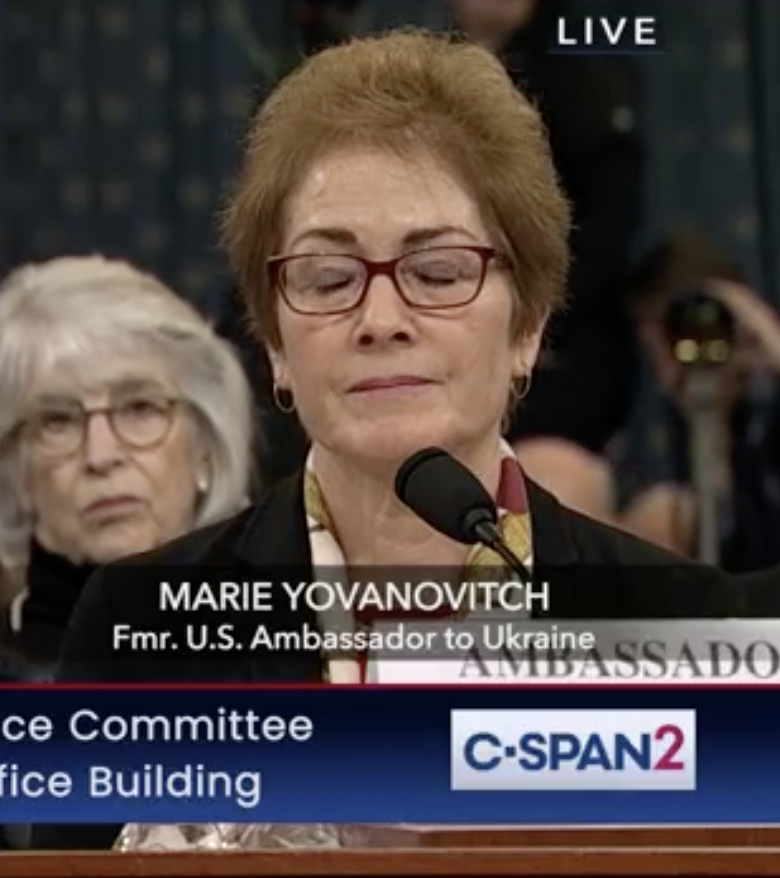
 ‘
‘